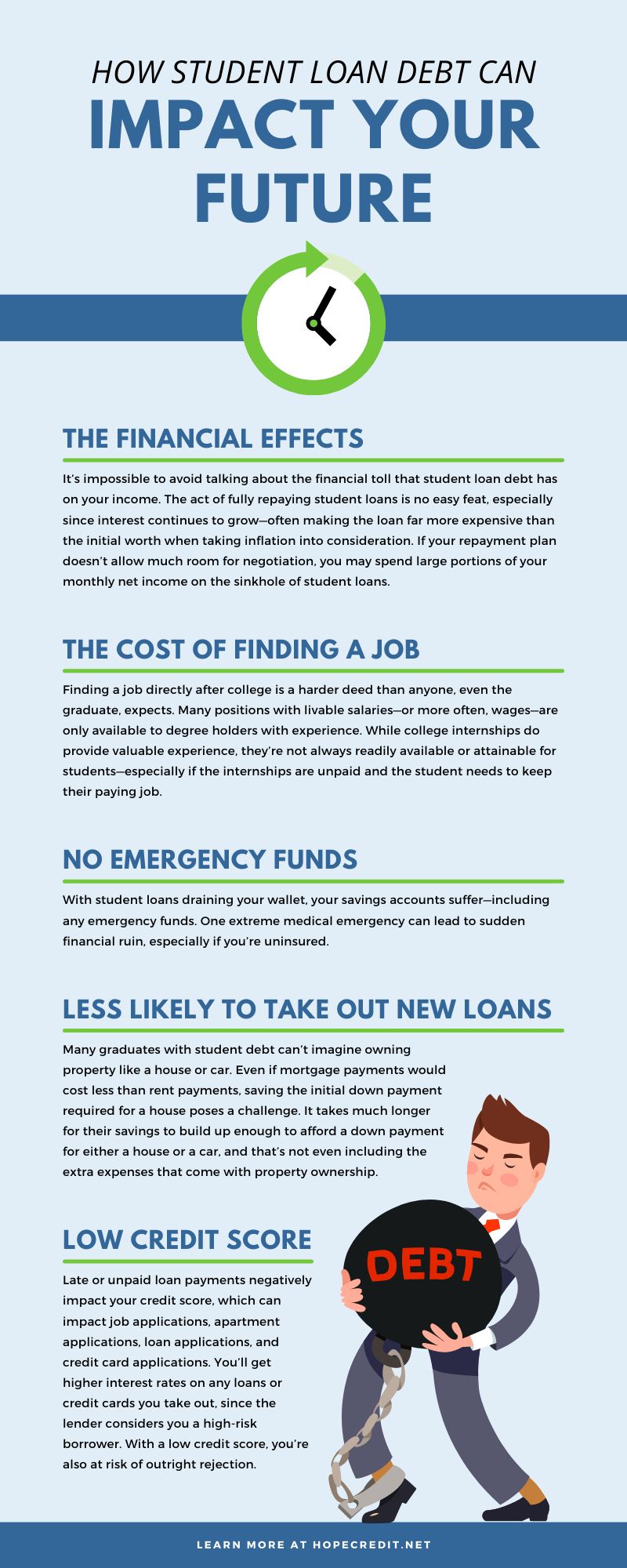- January 25, 2021
- Posted by: Carter Davis
- Categories: Knowledge Base, News

Student Loan Debt Can Impact Your Future. It’s dangerous to sit on your student loans for longer than necessary, especially if you’re struggling to make full payments. Whether you’re considering taking out student loans or are living in fear of the monthly payments beginning, it’s important to consider the role that thousands of dollars of student debt plays in your entire life.
The full weight of a commitment to either federal or private school loans may have consequences if you don’t do something about them before they overwhelm you. Learn how student loan debt can impact your future before it’s too late, and you’ll prevent stress down the line.
The Financial Effects
It’s impossible to avoid talking about the financial toll that student loan debt has on your income. The act of fully repaying student loans is no easy feat, especially since interest continues to grow—often making the loan far more expensive than the initial worth when taking inflation into consideration. If your repayment plan doesn’t allow much room for negotiation, you may spend large portions of your monthly net income on the sinkhole of student loans. Of course, this leaves you with less money to spend on other necessary monthly expenses, like food or bills.
Often, people without student loans look at today’s loan holders and suggest finding a well-paying job or making risky investments. Many graduates with heavy student debt are those who come from a middle-class background; these students didn’t qualify for the same student aid that lower-class students do and don’t have the same privileges as those from high-class families. As far as making wealthy investments, they don’t have much money to spend on such things—every penny goes toward their monthly expenses.
The Cost of Finding a Job
Finding a job directly after college is a harder deed than anyone, even the graduate, expects. Many positions with livable salaries—or more often, wages—are only available to degree holders with experience. While college internships do provide valuable experience, they’re not always readily available or attainable for students—especially if the internships are unpaid and the student needs to keep their paying job.
This leaves many college graduates in a state of purgatory—do they take a minimum wage job for basic income or continue holding out for a career in their field that pays a bit more? For many graduates with upcoming student loan payments, the answer is the former.
While the graduate is making student loan payments, they also need to concern themselves with the costs of finding a job:
- Gas, transportation, or travel (including a car if in a rural area)
- Relocation
- Interview and work attire
- Required technology for an interview (a webcam, laptop, and internet connection)
No Emergency Funds
With student loans draining your wallet, your savings accounts suffer—including any emergency funds. One extreme medical emergency can lead to sudden financial ruin, especially if you’re uninsured.
Less Likely To Take Out New Loans
Many graduates with student debt can’t imagine owning property like a house or car. Even if mortgage payments would cost less than rent payments, saving the initial down payment required for a house poses a challenge. It takes much longer for their savings to build up enough to afford a down payment for either a house or a car, and that’s not even including the extra expenses that come with property ownership.
These graduates usually end up living with their parents for many years while they search for a higher paying job and save up to move out. Not only do they have to deal with the stigma of a young adult living with their parents, but they often would rather rent an apartment than save for a condo or home. Since they’re so unsure of their financial security and employment status, they can’t be certain that they’d stay in one place for longer than a year—making ownership less practical than renting.
In addition to student loan repayments, which make it difficult to repay any additional loans, a new loan provider may turn away those with existing loans. If the graduate has the student loans under control, however, it shouldn’t affect a house purchase too much.
Low Credit Score
Late or unpaid loan payments negatively impact your credit score, which can impact job applications, apartment applications, loan applications, and credit card applications. You’ll get higher interest rates on any loans or credit cards you take out, since the lender considers you a high-risk borrower. With a low credit score, you’re also at risk of outright rejection.
There are ways to avoid paying student loans while maintaining a steady credit score, like income-based repayment plans, but they’re only available for federal student loan holders. Handling your student debt problems early before they become a major issue can salvage your credit score—though the score may initially dip.
Wage Garnishment and Collection
After you’ve begun defaulting on student loan payments, your lender may undergo collection efforts to enforce repayment. One such method is through wage garnishment. Lenders may take up to 15% of your disposable pay, or your net income. They may also employ private collection agencies or take from your Social Security and tax refunds in a process known as offset. If they hire a collection agency, not only will you have to pay back your loan—you’ll have to pay for the collection agency as well.
If this ever happens to you, make sure that you know your debt collection rights. You have the right to receive a 30-day notice for wage garnishment and a 60-day notice for offset. After you begin defaulting on payments, seek private or federal student debt relief as soon as possible to avoid any of these consequences.
A Halt To Motivation
Graduates burdened by the weight of student loan debt may feel railroaded into a bleak, unmotivating future. Those with degrees in the arts may face difficulties finding time for their craft, especially after settling into a low-paying job that drains all of their creative energy. A graduate with a STEM degree may have difficulties breaking into their field of choice and may face the same problems while paying off their loans.
Suddenly, the things that they loved are far off fantasies—even with the degree in hand. Some students never graduate, but still need to pay off their loans, which may put them in extremely dire straits.
Despite this, there is still hope. The student loan professionals at Hope Credit are here to help you find the best resolution for your debt, whether you need debt forgiveness or lower payments. With our expert guidance, you can move on from this chapter of your life and no longer worry about how student loan debt can impact your future.
Hope Credit can provide you with student loan professionals who can get you through the fear and doubt.
CALL FOR A FREE QUOTE: (760) 916-9313Or Contact Us: HopeCredit.net/contact-us/

